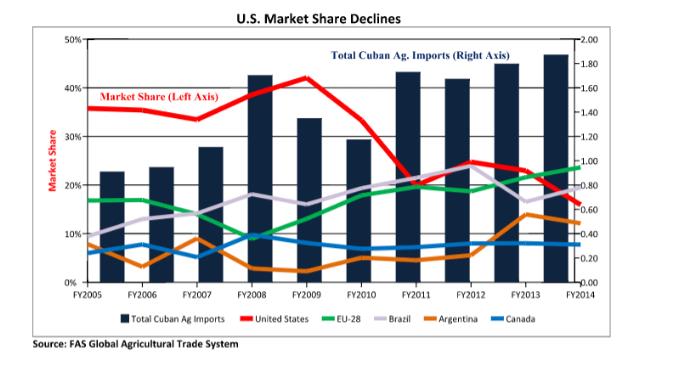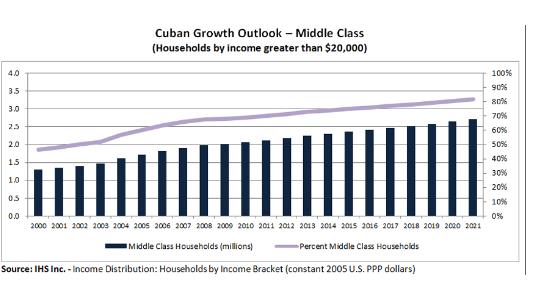Although the United States and Cuba have already turned a page on an era defined by the Cold War, the death of Fidel Castro is widely considered a milestone marking a new path forward.
This is no longer a policy issue that can be reduced to a conflict between the U.S. and Cuban governments, or to the legacy of the past. It is time to look ahead for the benefit of the people in both countries.
Below are just some of the reasons why it is in the best interest of U.S. citizens to support U.S. engagement with Cuba:
Progress in U.S.–Cuban relations has been good for U.S. businesses, but it could be even better for business if the United States continue to expand the boundaries of trade relations:
- U.S. companies have signed agreements to do business with Cuba, including Netflix, Marriott, General Electric, and Verizon. Cuba is Airbnb’s fastest-growing market ever. Several other companies spanning multiple sectors have visited the island. Two U.S. banks now offer credit cards for use. These companies have invested significant time and money into expanding service to Cuba.
- Florida Produce of Hillsborough County Inc., an agricultural company, was the first American company to be granted permission to open an office on Cuban soil. Florida Produce has been exporting fresh fruit and vegetables to Cuba from out of Tampa bay area since the 2001 Trade Sanctions Reform Act was passed. It is an example of the opportunities: in 2005, it secured a $30 million contract for the export of northern beans from Nebraska to Cuba.
- Business Monitor International estimates that the Cuban telecommunications market will grow 24% this year and will reach a subscriber base of 4 million Cubans. The Cuban government plans to increase Internet access to 50% of the population and mobile telephone services to 60% by 2020. Already, phone companies like Sprint, Verizon, AT&T and T-Mobile are offering roaming in Cuba.
- Eight airlines have signed deals to operate as many as 20 daily flights from the United States to Havana. On November 28, the first commercial flight, operated by American Airlines, leaving Miami for Cuba landed in Havana.
- Currently, Venezuela and China are Cuba’s largest trading partners. According to official Cuban data, they have traded over $1.5 billion in 2015, a 57% increase from 2014. In the growing tourism sector, two golf resort projects valuing over $810 million are being built by a Chinese and a British company on the Cuban coast. A Spanish company, Hotelsa Alimentacion, was one of the first companies to be based at Cuba’s hotspot for investment and development, Mariel Special Development Zone (ZEDM). These are opportunities currently out of reach for U.S. firms because of our embargo.
Expanded commercial opportunities have benefited U.S. farmers, agricultural workers, and exporters, but U.S. policy limits their access to the Cuban market:
- Cuba has the largest population in the Caribbean, with 11 million people. It currently imports almost 80% of its food to feed this population. This means it has a nearly $2 billion agricultural import market that U.S. workers and farmers in the agricultural industry have limited access to. This industry supports 17.3 million jobs in the United States.
- U.S. law permits agricultural exports to Cuba on a cash basis. That restriction on credit has hurt our exporters, as Cuba has turned to other suppliers who offer credit, such as Vietnam, China, Canada, Brazil, and others. U.S. agricultural exports declined in 2015 after five years of steady growth. One of the biggest drops was in livestock products. The U.S. poultry industry could stand to gain from engagement, given that poultry accounted for 10% of Cuba’s imports in 2014.
- In 2014, dairy accounted for 14% of Cuba’s imports, soy products 13%, wheat products 13%, corn 11%, and rice 10%. The United States trails the European Union and Brazil in agriculture exports to Cuba.

- There is more purchasing power in Cuba with more U.S. travel and with the removal of lifting restrictions on remittances, now estimated to be as high as $2 billion annually. This increases demand for agriculture goods.

Most Americans, including Cuban-Americans, want the freedom to travel to Cuba
Cuba is the only place on Earth which U.S. citizens are not free to visit, and no other country in the world bans its citizens from traveling to the island.
- A CBS News poll found that 81% of Americans support ending travel restrictions, including 71% of Republicans. Among Cuban Americans, 75% support lifting the ban, including 94% of recent arrivals. Cuban-Americans make more than 400,000 trips a year to the island, mostly to visit relatives and support the family economy.
- About 600,000 U.S. travelers visit Cuba each year, including the roughly 150,000 Americans with no family ties, who traveled to the island in 2015, up from 91,000 in 2014. According to Cuban government statistics, 71,815 non-Cuban born U.S. travelers visited the island in the first three months of 2016, a 94% increase from the same period last year. If travel restrictions are lifted, Cuban officials estimate about 1.5 million Americans would visit Cuba annually.
- An increase in tourism would also increase demand for U.S. products on the island, especially from the tourism and agricultural sectors, should they be allowed to do business there.
- Although Cuban-Americans have historically been the most hardline U.S. population supporting the embargo, the community is changing. In 1991, just 13 percent of Cuban-Americans opposed the embargo. By 2011, 44 percent opposed the embargo. In 2014, according to a Florida International University poll, 52 percent of Cuban-Americans are in favor of lifting the embargo. And in 2016 that number climbed to 63%.
It’s good for our national security, and for our relations in Latin America:
- There is currently a U.S.-Cuba working group on security cooperation that has subgroups on counter narcotics, counter terrorism, migration, cyber security, law enforcement, and criminal investigation. Progress in all these areas is in our national interest.
- Engagement with Cuba means that we are not leaving relationships on the island to governments with which we are at odds. As K.T. McFarland, President-Elect Trump’s candidate for deputy national security adviser has said:
The United States cannot allow our adversaries to once again dominate Cuba. We keep hearing that Cuba is woefully stuck in the 1950s, and needs massive infusions of cash, investment and infrastructure to enter the modern world… We must take steps now to ensure that Cuba doesn’t become a Russian or Chinese pawn, and thus serve as a launch pad to threaten America’s security were they to establish a military presence.
- Improving relations with Cuba has allowed us to remove a troubling irritant from our relations with the rest of the hemisphere. The United States has been applauded in Latin America for the decision to re-engage with Cuba.
Recognizing these benefits, an increasing number of Republicans want engagement for their constituencies.
Because of the above benefits more and more Republicans in Congress favor easing or ending the embargo. Republicans in the Senate and a growing number in the House of Representatives are not only supporting legislation that would lift the embargo, but are taking the lead on it. This is a significant change. Republican lawmakers such as Rick Crawford (R-AR) and Tom Emmer (R-MN) are pushing for engagement. There are currently three pieces of legislation that would allow Americans to freely travel, trade and benefit from engagement with Cuba:
- The Freedom to Travel to Cuba Act of 2015 allows all U.S. citizens to travel to Cuba (20 Republican backers).
- The Cuba Trade Act of 2015, would allow U.S. businesses in the private sector to trade with Cuba without restrictions (11 Republican backers).
- The Cuba Agriculture Exports Act, would allow credit to be used for U.S. agricultural export to Cuba and permit U.S. investment in privately owned Cuban agricultural businesses (25 Republican backers).
A less hostile U.S. policy is also good for the Cuban people. They are overwhelmingly ready for change. Not only have improved relations driven private sector growth and opened the space for political debate, but bridged the divide that ideological differences has driven between families. Please see here, to learn more about Cuba’s reform process.

